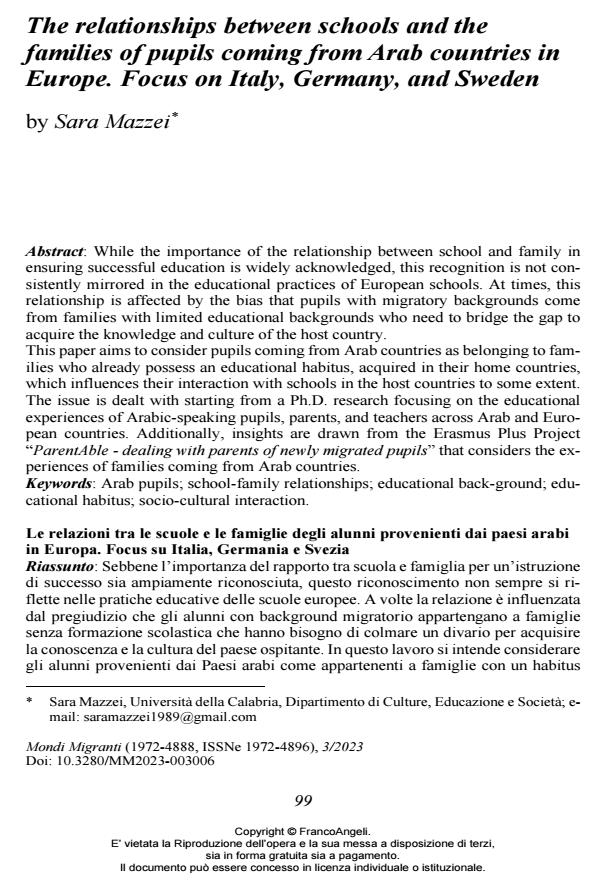The relationships between schools and the families of pupils coming from Arab countries in Europe. Focus on Italy, Germany, and Sweden
Titolo Rivista MONDI MIGRANTI
Autori/Curatori Sara Mazzei
Anno di pubblicazione 2023 Fascicolo 2023/3
Lingua Inglese Numero pagine 16 P. 99-114 Dimensione file 244 KB
DOI 10.3280/MM2023-003006
Il DOI è il codice a barre della proprietà intellettuale: per saperne di più
clicca qui
Qui sotto puoi vedere in anteprima la prima pagina di questo articolo.
Se questo articolo ti interessa, lo puoi acquistare (e scaricare in formato pdf) seguendo le facili indicazioni per acquistare il download credit. Acquista Download Credits per scaricare questo Articolo in formato PDF

FrancoAngeli è membro della Publishers International Linking Association, Inc (PILA), associazione indipendente e non profit per facilitare (attraverso i servizi tecnologici implementati da CrossRef.org) l’accesso degli studiosi ai contenuti digitali nelle pubblicazioni professionali e scientifiche.
While the importance of the relationship between school and family in ensur-ing successful education is widely acknowledged, this recognition is not con-sistently mirrored in the educational practices of European schools. At times, this relationship is affected by the bias that pupils with migratory backgrounds come from families with limited educational backgrounds who need to bridge the gap to acquire the knowledge and culture of the host country. This paper aims to consider pupils coming from Arab countries as belonging to families who already possess an educational habitus, acquired in their home countries, which influences their interaction with schools in the host countries to some extent. The issue is dealt with starting from a Ph.D. research focusing on the educational experiences of Arabic-speaking pupils, parents, and teach-ers across Arab and European countries. Additionally, insights are drawn from the Erasmus Plus Project “ParentAble - dealing with parents of newly migrated pupils” that considers the experiences of families coming from Arab countries.
Sebbene l’importanza del rapporto tra scuola e famiglia per un’istruzione di successo sia ampiamente riconosciuta, questo riconoscimento non sempre si riflette nelle pratiche educative delle scuole europee. A volte la relazione è influenzata dal pregiudizio che gli alunni con background migratorio appar-tengano a famiglie senza formazione scolastica che hanno bisogno di colmare un divario per acquisire la conoscenza e la cultura del paese ospitante. In que-sto lavoro si intende considerare gli alunni provenienti dai Paesi arabi come appartenenti a famiglie con un habitus educativo, acquisito nei Paesi di origi-ne, da cui dipende in parte il modo in cui si rapportano alla scuola nei Paesi ospitanti. Il tema viene trattato a partire da una ricerca di dottorato sulle espe-rienze educative di alunni, genitori e insegnanti di lingua araba tra paesi arabi ed europei e dal pro-getto Erasmus plus ParentAble – che si occupa di genitori di alunni neo-immigrati e prende in considerazione le esperienze di famiglie provenienti dai paesi arabi.
Parole chiave:alunni Arabi rifugiati; relazioni scuola-famiglia; background educativo; habitus educativo; interazione socio-culturale.
Sara Mazzei, The relationships between schools and the families of pupils coming from Arab countries in Europe. Focus on Italy, Germany, and Sweden in "MONDI MIGRANTI" 3/2023, pp 99-114, DOI: 10.3280/MM2023-003006